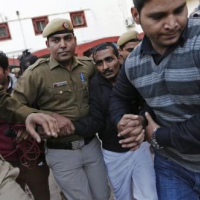Uber Grounded in Delhi After Rape Allegation
 Driver Shiv Kumar Yadav (centre) escorted out of court by policemen (photo: Reuters)
Driver Shiv Kumar Yadav (centre) escorted out of court by policemen (photo: Reuters)
Online ride-hailing service Uber has been banned from operating in Delhi after one of its drivers allegedly raped a female passenger on Friday night. Shockingly, Uber had employed the driver even though he was arrested in 2011 on allegations of sexual assault. With the company failing to conduct a background check on the driver and the driver seemingly easily circumventing its vaunted GPS tracking system, many in India were left wondering where the layers of security that Uber promised actually were.
Police said the 32-year-old driver, Shiv Kumar Yadav, dropped the woman home after attacking her and warned her not to inform the authorities. She managed to note the driver's number and take a photograph of his car, they said.
Police tracked Yadav down and arrested him on Sunday from Mathura, 160 kilometres from Delhi, where he had fled.
The arrested driver appeared in court on Monday and was remanded in custody for three days. He had been arrested on charges of raping a woman three years ago but was later acquitted, police said.
Special commissioner Deepak Mishra said early investigations showed GPS had not been installed in the taxi and police background checks were not conducted on the driver. The San Francisco-based company also could not initially produce the call records of the suspect as its server was located in the US.
"Keeping in view the violation and the horrific crime committed by the driver, the transport department has banned all activities relating to providing any transport service by the www.Uber.com," special commissioner Kuldeep Singh Gangar told reporters.
Under the terms of the ban, any drivers using Uber to find passengers may be fined, or have their vehicles impounded. A spokeswoman for Uber said she could not immediately comment.
Yet, according to BBC News, the company is still reportedly accepting bookings on its app and it not clear how the ban could be enforced since Uber taxis do not carry any visible branding.
Uber had issued a statement prior to the ban, saying its thoughts were with the young woman and it would do “everything to help bring this perpetrator to justice.” But Travis Kalanick, Uber’s chief executive officer, tried to deflect some of the blame on to the Delhi government.
"We will work with the government to establish clear background checks currently absent in their commercial transportation licensing programs,” he said in a statement.
So this is what the app is all about: promise “safety” to customers, and when it turns out that it hasn’t done a background check on a driver, claim that the government is somehow to blame.
This comes at a time when the company has faced critical news coverage over its driver screening in the United States, and has apologised for comments by an executive who proposed "digging up dirt" on journalists investigating the firm.
That has not, however, stopped Uber from raising investment that values it at $40 billion, reflecting the potential of its expansion into high-growth markets like India.
Some of that growth now looks optimistic given that Delhi is out of bounds, with other cities likely to follow suit.
- Karan Singh
To Learn More:
Uber banned from operating in Delhi after rape accusation (by Malini Menon, Reuters)
Delhi cab rape: Accused driver sent to 3-day police custody; Uber services banned in Capital (by Karn Partap Singh and Avantika Mehta, Hindustan Times)
Delhi bans Uber after driver sex assault allegations (by Amy Kazmin, The Financial Times)
- Top Stories
- Controversies
- Where is the Money Going?
- India and the World
- Appointments and Resignations
- Unusual News
- Latest News
- India College Chain’s Expansion into U.S. Draws Opposition from Massachusetts Officials over Quality of Education
- Milk Shortages in India Tied to Release of New Movies Featuring Nation’s Favorite Stars
- Confusion Swirls around Kashmir Newspaper Ban in Wake of Violent Street Protests
- Polio-Free for 5 Years, India Launches Vaccine Drive after Polio Strain Discovery
- New Aviation Policy Could Increase Service, Lower Ticket Prices






Comments